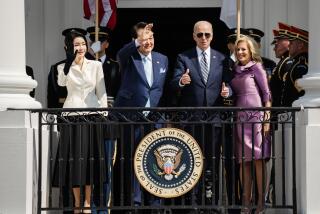Incoming S. Korean Leader to Visit U.S.
- Share via
SEOUL — Trying to dispel an anti-American image, South Korean President-elect Roh Moo Hyun accepted an invitation from President Bush on Friday to visit Washington as soon as possible and pledged to work to strengthen his country’s alliance with the U.S.
The day after Roh’s victory in a bitterly contested election, Bush telephoned to offer his congratulations and extend the invitation. There is some urgency to the visit, expected soon after Roh’s inauguration Feb. 25, because of North Korea’s recent threat to resume its nuclear program. U.S. policy toward the North has been stalled, in part because of uncertainty over who would win the election.
Roh, 56, a lawyer who once represented radical students, has never been to the United States, and during the campaign he ridiculed as “a legacy of the colonial mentality” South Korean politicians’ fondness for flocking to Washington to have their pictures taken.
Backers of Roh’s conservative opponent, Lee Hoi Chang, tried to use that comment and others to depict Roh as a dangerous firebrand who, they hinted darkly, would sell out South Korea to the North.
On his first day as president-elect, Roh worked to soften that image and to reassure the mainstream. During the telephone conversation with Bush, he “agreed to work closely together for peace on the Korean peninsula and strengthen the South Korea-U.S. alliance,” Roh’s office said in a press release.
Bush’s spokesman, Ari Fleischer, described the 10-minute talk as “warm.”
“President-elect Roh accepted President Bush’s invitation to visit Washington at his earliest convenience,” Fleischer said. He also said the United States and Roh’s transition team would probably exchange envoys before that meeting.
Friday morning, Roh gave a speech in which he spoke cordially of the United States--while hinting that he would like to see changes.
“The traditional friendship and alliance between the Republic of Korea and the United States must mature and advance,” Roh said, in a cautious reference to his demands that South Korea play an equal role in the partnership.
Like incumbent Kim Dae Jung, Roh disagrees with the Bush administration’s insistence on isolating North Korea until the Communist regime repudiates its weapons programs.
“It is not a matter of whether President Bush is right or wrong, but a question of solving the problem,” Roh said in an interview last week. “One can use both a carrot and a stick with North Korea, but if you use a stick and it fails, the results will be devastating.... The carrot, I know, will definitely work in the end....There is no other way.”
In Friday’s speech, Roh also said he wants to address the Status of Forces Agreement, which governs the 37,000 U.S. troops stationed in South Korea. South Koreans have been calling for changes in the agreement, especially since the recent acquittal by courts-martial of two GIs who accidentally killed two South Korean girls with an armored minesweeping vehicle.
Roh’s supporters believe that the Bush administration should listen more closely to South Korea in formulating its policy toward the North, especially because Seoul lies barely 25 miles from the demilitarized zone that separates the countries and could sustain tremendous damage if a war broke out.
“For you, North Korea is an important foreign policy matter, but it is life and death to the Korean people,” said Huh Un Na, an assemblywoman who served as a Roh campaign advisor.
Despite policy differences, Huh said, she expects Roh and Bush to get along well because Roh is more American in style than most Korean politicians.
“I think that the United States is unnecessarily worried about Mr. Roh about being anti-American,” she said.
Roh said in last week’s interview that a healthy relationship depends more on a South Korean president “who thinks rationally” than on one who is in complete agreement on policy.
*
Times staff writer Maura Reynolds in Washington contributed to this report.
More to Read
Sign up for Essential California
The most important California stories and recommendations in your inbox every morning.
You may occasionally receive promotional content from the Los Angeles Times.












